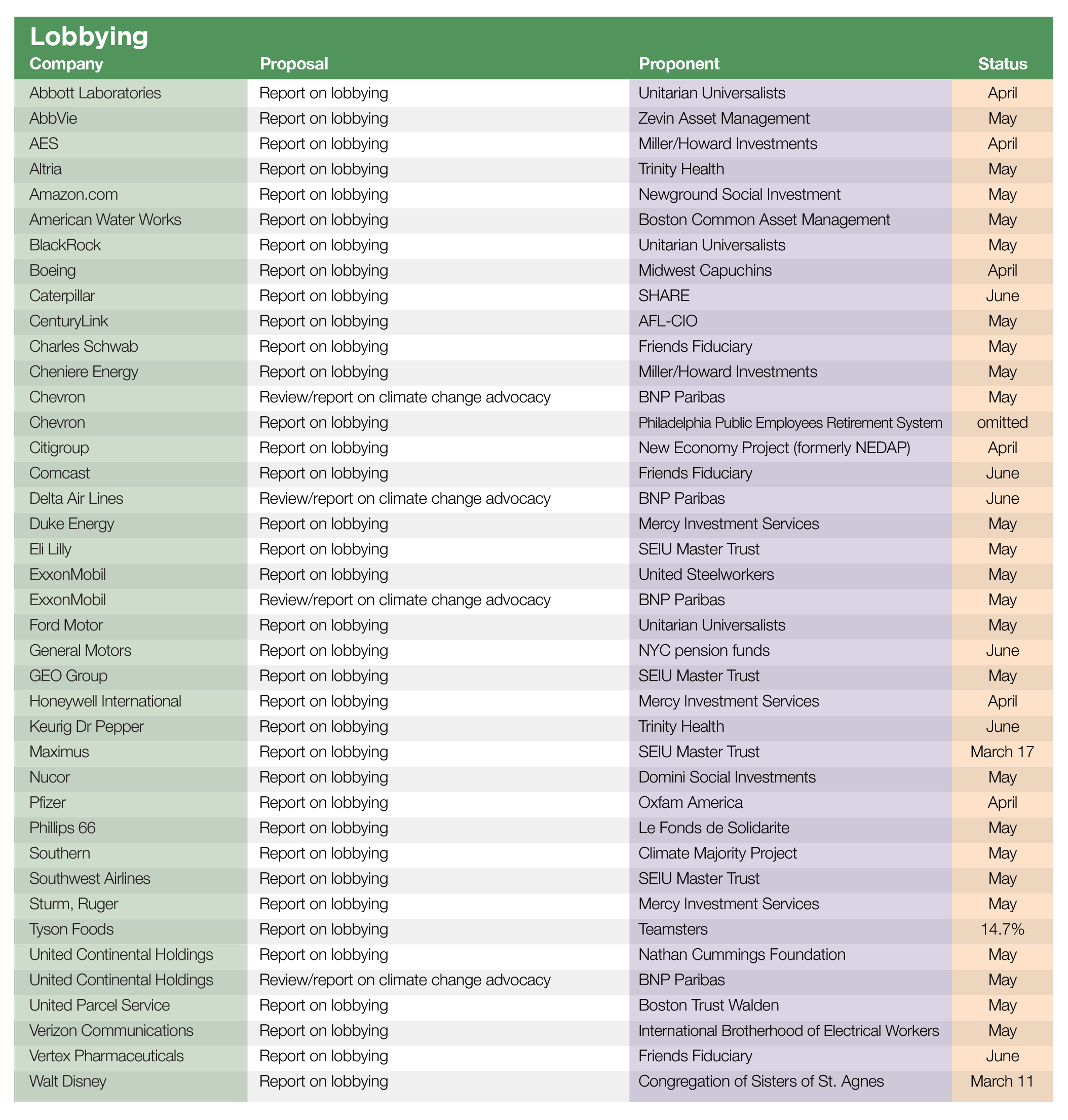The lobbying transparency campaign is coordinated by Boston Trust Walden and the American Federation of State, County and Municipal Employees (AFSCME).
Primary resolution: The resolved clause for the main lobbying campaign resolution remains the same and was filed at 41 companies (see table for a full list). Eighteen are resubmissions, 10 of which had seen a vote increase last year from earlier. Two filed this year would not have been eligible under the proposed new SEC rule since they did not receive at least 25 percent support; Ford Motor’s third-year proposal received 16.5 percent and Tyson Foods’ earned 11.2 percent in its fourth year (it already has gone to a vote this year, getting 14.7 percent). At both companies, founding family ownership always produces votes that are lower than is typical for an issue.
The main proposal asks for an annual report that includes:
Company policy and procedures governing lobbying, both direct and indirect, and grassroots lobbying communications.
Payments by [the company] used for (a) direct or indirect lobbying or (b) grassroots lobbying communications, in each case including the amount of the payment and the recipient.
[The company’s] membership in and payments to any tax-exempt organization that writes and endorses model legislation.
Description of the decision-making process and oversight by management and the Board for making payments described in sections 2 and 3 above.
For purposes of this proposal, a “grassroots lobbying communication” is a communication directed to the general public that (a) refers to specific legislation or regulation, (b) reflects a view on the legislation or regulation and (c) encourages the recipient of the communication to take action with respect to the legislation or regulation. “Indirect lobbying” is lobbying engaged in by a trade association or other organization of which [the company] is a member.
Both “direct and indirect lobbying” and “grassroots lobbying communications” include efforts at the local, state and federal levels.
The report shall be presented to the Audit Committee or other relevant oversight committees of the Board and posted on [the company]’s website.
Votes—Investors at Tyson Foods gave the proposal 14.7 percent in February. Other early votes will occur at Maximus on March 17 and Walt Disney on March 11.
COULD LOBBYING DISCLOSURE AT BOEING HAVE PREVENTED OVERSIGHT LAPSES THAT LED TO FATAL CRASHES?
JOHN KEENAN
Corporate Governance Analyst, AFSCME Capital Strategies
Boeing is one of the biggest corporate spenders on federal lobbying, spending over $166 million since 2010, and Boeing’s reputation and financial health remain at serious risk in the wake of two fatal crashes of its 737 MAX.
Withdrawals—So far, proponents have withdrawn four proposals after reaching agreements, at AES (a new recipient), BlackRock (21.7 percent in its third year in 2019), CenturyLink (36.2 percent in its third year) and Nucor (36.2 percent in its third year).
SEC action—As noted above, the proposal at Chevron has been pushed aside in favor of one from the conservative National Center for Public Policy Research. The SEC did not agree with a challenge from Walt Disney that its proposal was moot. Still awaiting a response from the SEC is a GEO Group challenge that says its resolution from SEIU is ordinary business, is moot and relates to the union’s complaints with the company and not broader shareholder concerns.
Climate-related advocacy: Four new proposals from one of the world’s largest banks, BNP Paribas, reiterate investors’ concerns about corporate efforts to specifically influence public policy about climate change, creating two political resolutions at Chevron, ExxonMobil and United Continental Air Lines—as well as one more at Delta Air Lines. The proposal asks for a report
within the next year...describing if, and how, [the company’s] lobbying activities (direct and through trade associations) align with the goal of limiting average global warming to well below 2 degrees Celsius (the Paris Climate Agreement’s goal). The report should also address the risks presented by any misaligned lobbying and the company’s plans, if any, to mitigate these risks.
SEC action—Exxon has challenged the proposal at the SEC, arguing that it duplicates the other resolution about lobbying that it received first; a withdrawal therefore seems likely.



